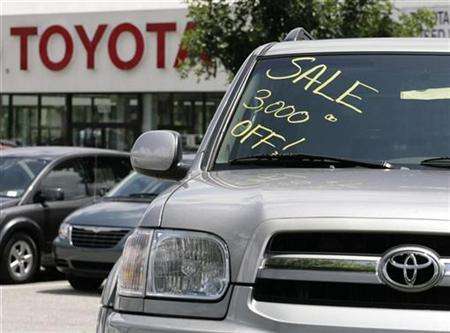Toyota: U.S. Market Hasn't Hit the Bottom Yet
Why the Hell would it? The U.S. “housing crisis” is far from over, money’s too tight to mention, getting credit’s a bitch and the consumer shift to more fuel efficient vehicles has left millions of SUV owners backwards/underwater on their loans. Amongst other things. Anyway, the idea that U.S. new vehicles sales have “bottomed-out” is a combination of wishful thinking and boilerplate bullshit, largely perpetuated by the weasel-word factory known as General Motors’ PR. (Show me ONE MONTH of sales gains and THEN we’ll talk.) As I wrote in my latest General Motors Death Watch, Automotive News [AN, sub] fell for– indeed perpetuated– this spinmeistery hook, line and sinker. In an attempt to atone for their shameless capitulation to Mark LaNeve’s mob, AN has followed-up with a micro-story on Toyota’s take on the American car market’s doldrums [via Reuters]. And here it is: “Despite signs of steadier U.S. auto sales in August, it remains uncertain whether industrywide sales in the largest vehicle market have hit bottom, Toyota Motor Corp. Vice Chairman Kazuo Okamoto said today. ‘It’s hard to say whether the U.S. market has hit bottom,’ Okamoto told reporters. Okamoto, speaking through a translator, also said that despite the recent decline in oil prices, Toyota, the world’s largest automaker, was still assuming oil prices would be higher over the long term as the basis for its product planning.”
More by Robert Farago

































Comments
Join the conversation
AS Gordon Brown says "Recession - what recession!"
Don't get wrapped around the axle comparing 2008 to 1929. If it happens, the effects will be several years down the road. By end of 1933 GDP had declined 50 percent from 1929 and 25 percent of the workforce unemployed. Unemployment did not go below 14 percent rest of the decade. Average GDP 1930 - 2007 is 3.4 percent per year. One standard deviation is 5.1 percent meaning wild swings are normal economic performance. GDP is reported as inflation adjusted unless stated as Nominal GDP which is not adjusted.
Just a thought, maybe this combines the two theories. Maybe the economy has reached a point of 'saturation'. The majority of people have enough houses, enough cars, etc. Perpetual growth is not possible in durable goods markets, because after a while everyone's got one, and when times aren't booming, not everyone has a reason to get a new one....